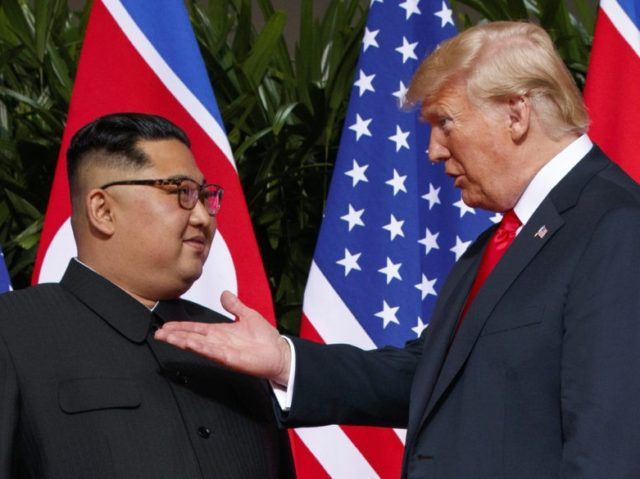An unnamed diplomatic source revealed to South Korean newspaper Chosun Ilbo on Wednesday that, despite being a week away from the event, the U.S. and North Korea have not confirmed a discussion agenda for the summit between U.S. President Donald Trump and dictator Kim Jong-un.
The meeting, their second in as many years, is scheduled to occur in Vietnam on February 27. Kim has planned to arrive in the country early and engage in a state visit with the heads of the Vietnamese government, reportedly to discuss how Vietnam maintains a communist dictatorship while stabilizing its economy.
Most observers and experts agree that Trump and Kim will likely discuss “denuclearization,” but Stephen Biegun, American special envoy for North Korea, admitted this month that the two sides have not agreed on a definition of the word. While Washington typically defines denuclearization as an end to North Korea’s illegal nuclear weapons program, Pyongyang claims that true denuclearization would require the removal of all American assets from the Korean peninsula, as the United States is a nuclear power.
North Korea, in turn, has repeatedly made clear that among its top priorities is convincing America to support the repeal of international sanctions against the regime, currently the strictest economic sanctions placed on any country in the world.
“At the moment, nothing has been agreed between the two sides,” a “diplomatic source” reportedly told Chosun Ilbo on Wednesday regarding talks between the two sides in preparation for next week. “The success or failure of the summit depends on the outcome of these working-level talks a week ahead of the summit.”
Chosun‘s reporting suggests that American negotiators have, at least, prepared with a list of demands for North Korea that includes “a liaison office, declaring an end to the Korean War, and resuming package tours to the Mt. Kumgang resort in return for the dismantlement of the Yongbyon nuclear facility and Tongchang-ri missile base.” Yongbyon is not a weapons facility – it is used to refine nuclear material and features energy reactors. Similarly, Tongchang is not a nuclear facility but used to make missiles that can be equipped with nuclear materials.
North Korea claimed to shut down its Punggye-ri Nuclear Test Site last year, inviting journalists to watch explosions in front of the facility in May but banning any journalists with nuclear physics expertise. Subsequent reports suggested, however, that Punggye-ri is either still functional – as the explosions in question did not occur deep in the cavernous facility – or had been destroyed in the nation’s last nuclear test in September 2017, meaning its “dismantlement” was not an actual concession from Pyongyang.
In its posture statement released this month, the Pentagon’s Indo-Pacific Command (INDOPACOM) warned that North Korea was an “immediate” threat to the United States and there was no evidence that the Kim regime would soon give up its nuclear weapons.
Chosun notes that Biegun arrived in Hanoi on Wednesday for final preparations for the summit. South Korea’s Yonhap news agency similarly reported that Kim Hyok-chol, North Korea’s special representative for U.S. affairs, arrived in Hanoi from Beijing on Wednesday and will lead talks with senior American diplomats to confirm topics on the docket for Trump and Kim.
In remarks early this month, Biegun said that the State Department and North Korea “do not have a specific and agreed definition of what final, fully verified denuclearisation” means, making it difficult for both sides to agree on concrete steps towards that goal. Most recently, in December, North Korean media suggested that “denuclearization” could only be achieved by ending the U.S. military presence in Korea.
American troops are stationed in South Korea because the Korean War is technically still ongoing. While all sides – also including South Korea and China – signed an armistice agreement in 1953, they never signed a peace treaty and, thus, remain at war. North Korea has regularly urged for the signing of a peace treaty to facilitate the removal of American troops from the Korean border.
The United States has made “denuclearization” a prerequisite for lifting sanctions on North Korea. The sanctions prohibit most trade with the country in response to its belligerence against most of its neighbors, notably excepting China, and in response to its brutal human rights abuses, which North Korea has made no known steps to end.
North Korea’s ambassador to the United Nations, Kim Song, recently issued a memo urging the U.N. to reconsider the sanctions in light of the nation’s significant food shortages. The memo, which NBC News published on Wednesday, claims that “the country produced 503,000 fewer tons of food than in 2017 due to record high temperatures, drought, heavy rainfall and — in an unexpected admission — sanctions.”
That alleged reality, Kim wrote, “vindicates that humanitarian assistance from the UN agencies is terribly politicized and how barbaric and inhuman sanctions are.”
Detractors of the regime noted that North Korea’s food shortages have done little to stop it from investing in its nuclear weapons program and its military more generally.

COMMENTS
Please let us know if you're having issues with commenting.